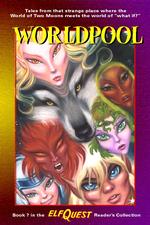|
GENRES:
Fantasy
AUDIENCE:
Adults, teens, older kids; mild violence
NOTE: I know this book is a collection of various issues of
the Worldpool series, but there's no indication of which
issues. And yes, that "?" belongs in the series note--it's
not something I forgot to look up.
SYNOPSIS:
This is an Elfquest "what-if" book, telling stories
outside the accepted canon (or thread, if you will).
- The first story, untitled and taking place "in an untold
time between Abode's climb out of its own dark ages and its reach
for the stars," concerns the hunter Par Tolfsson. Teased
unmercifully because he searches for elves, he tells his story
to the young girl Deemer Elder. In his younger days he had stumbled
on the ruins of the four-fingered hand-statue worshiped by the
Hungtsho (from Forevergreen).
Unfortunately, already in possession of the ruins were a handful
of Junslanders, who wanted to wipe the knowledge of elves from
the planet altogether--and who weren't willing to let Par live
to reveal the existence of the statue.
- "Invasion Infestation" features the "Squirts"
(Smurf parodies), who are working with Winnowill to escape their
world, where they're "prized as delicacies." By turning
Cutter pink and pretending to be relatives of the Wolfriders,
they sow chaos, and Winnowill plans to take over when everyone
is too distracted to resist.
- "Small World" postulates a time when all
the elf tribes on Abode have been identified and made known to
one another. Now, the drastically under-breeding elves have occasional
big meetings when all the males look into the eyes of all the
females, hoping to trigger a Recognition and a new life.
- "Return of the Redeye" is a Star Wars parody that
mostly involves a flying log.
- "Long Dream's Ending" concerns the experiences
of the Glider, Egg, who remains within Blue Mountain, still maintaining
the Great Egg but so attuned to rock now that he is unable to
feel emotion. He finds himself in a battle for the Egg's integrity
with Timmain, the High One. Is her influence baneful or beneficial?
- "Grow Wild and the 7 Elves" is a Snow White parody.
- "King's Cross" is a true alternate history of the
Wolfriders, in which Cutter is the half-human son of Bearclaw
and a young noblewoman, and the Djun has taken control of all
"spirits": elves, trolls, and Preservers. However,
Winnowill's spirit is still out there somewhere, creating mischief;
so Cutter and the reluctant elves are sent to investigate. Along
the way, in between battling Winnowill's creations, Cutter learns
things about the Wolfriders and his parents that he never knew.
EVALUATION:
Of all the Elfquest books, this one is the most uneven in quality.
The best stories are the first, "Small World," and
"King's Cross," because they postulate things that
are worth thinking about. The alternate elf history in the latter
story, with Bearclaw performing the deeds that Cutter had performed
but in his own style, is especially good. The art in "Small
World" is a bit crude, but the idea of all the elves getting
together and trying to spark Recognitions is an excellent one--and
the story is also pretty funny, with its examinations of the
complications of such Recognitions. (If a Sun Villager Recognizes
a Go-Back, who goes where after the child has been conceived?)
The first story deals with an era that I'd like to see more stories
take place in--the "twentieth century" of Abode--but
the end of the story is telegraphed too obviously for the "revelation"
to be impressive.
On the other hand, "Long Dream's Ending" is unfathomable;
I can't figure out how Egg and his Great Egg survived the fall
of Blue Mountain, or why Timmain showed up, or her relationship
to him. And the three parody stories, with their rambling storylines,
goofy art, and unfunny jokes (e.g., Cutter's wolf is called "Acmerunner,"
Rayek is forced to wear Leetah's clothes when his luggage is
lost), grow tiresome very quickly. There wasn't even any point
in summarizing them.
Obviously, this is a book for people already very familiar
with Elfquest. It's recommended as part of the series
as a whole, but it cannot stand alone. |



